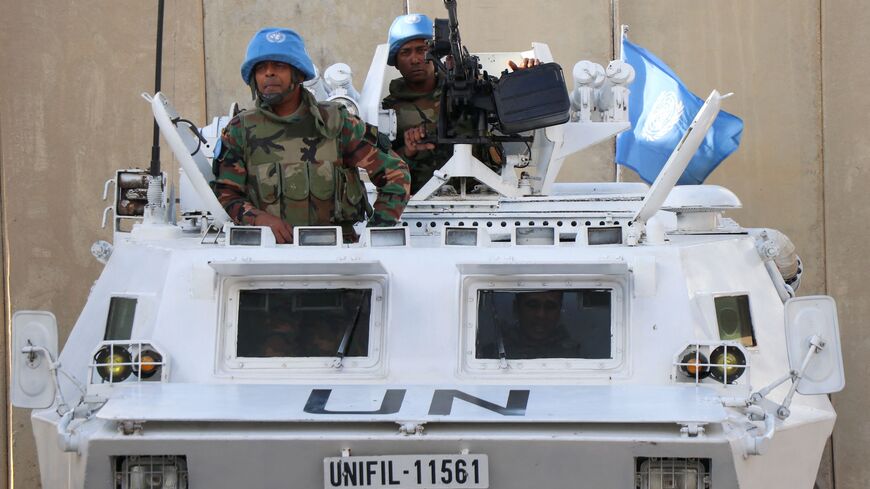BEIRUT — With cross-border fighting between Israel and Hezbollah escalating at an alarming rate, an incident involving the UN peacekeeping mission in Lebanon has added to already heightened tensions.
In Beirut’s Dahiyeh district, a Hezbollah stronghold, local individuals stopped an armored vehicle belonging to the United Nations Interim Force in Lebanon (UNIFIL), resulting in clashes between the peacekeepers and the individuals and the brief detention of the soldiers on Thursday evening, UNIFIL confirmed.
“A peacekeeping vehicle on a routine logistical movement to Beirut ended up on an unplanned route,” UNIFIL's deputy spokesperson Kandice Ardiel told the local news channel LBCI on Friday.
According to unconfirmed reports, Hezbollah members intercepted the UNIFIL vehicle after it entered the Hay al-Sellom area of Dahiyeh, which is outside UNIFIL’s area of operation, while in route to southern Lebanon.
Sources told the Lebanese news outlet Al-Modon that equipment and cameras found in the vehicle were confiscated, and the peacekeepers were detained and handed over to Hezbollah’s security committee amid suspicions that they were taking photographs of the area.
According to local reports, the peacekeepers, from the Malaysian battalion, were later released and handed over to the Lebanese Army.
Clashes between #Hezbollah operatives and a #UNIFIL force in #Beirut's Dahiya
— AbuAliEnglish (@AbuAliEnglishB1) March 1, 2024
Lebanese media reports on clashes between a force from the Malaysian UNIFIL battalion and "locals" in the Salem neighborhood in Dahiya of Beirut - Hezbollah's strongest stronghold. (1/3) pic.twitter.com/fex6J5GkZe
Hezbollah has not commented on the reports.
UNIFIL-Hezbollah tensions
Incidents involving Hezbollah and UNIFIL are not uncommon.
In December 2022, an Irish peacekeeper was killed and another seriously injured when two UNIFIL armored vehicles came under small-arms fire in the southern village of al-Aqbiya, another Hezbollah stronghold. The main suspect in the case, who is thought to be linked to Hezbollah, was released in November.
More recently, in December, an Indonesian peacekeeper was injured after a UNIFIL patrol came under attack by a group of men in Taybeh, in south Lebanon.
The UN peacekeeping force has been patrolling the Lebanese side of the Israel-Lebanon border since its establishment in 1978, following the withdrawal of the Israeli military, which briefly invaded Lebanon that year. Hezbollah's heavily armed militia has repeatedly accused UNIFIL of spying for Israel, whose forces actively patrol the other side of the border.
UNIFIL's mission has been amended several times over the years. In 2006, its mandate was bolstered under UN Security Council Resolution 1701, which ended the war that Israel and Hezbollah fought for more than a month.
Today, some 10,500 peacekeepers patrol the border area, including the Blue Line, the demarcation between Israel and Lebanon.
UNIFIL's Ardiel said in her statement, “We emphasize that, in addition to freedom of movement inside UNIFIL's area of operations, peacekeepers have the freedom and authorization from the Lebanese government to move throughout Lebanon for administrative and logistical reasons.”
She added, “This freedom of movement is essential to the implementation of Resolution 1701.”
Calls for calm
The latest incident in Dahiyeh comes as mediators scramble to avoid a full-scale war after Israeli-Hezbollah exchanges of fire took a serious turn in recent weeks, coupled with talks of a potential Israeli ground invasion, according to a CNN report.
In a statement on X earlier this week, UNIFIL said it had noticed a “concerning shift” in the cross-border fighting, which threatens the lives of tens of thousands of civilians on both sides of the border.
UNIFIL called on the parties involved “to prevent further escalation and leave space to a political and diplomatic solution.”
Iran-backed Hezbollah has been engaged in heavy cross-border fire with the Israeli military since the Hamas-Israel war in Gaza began, in early October, claiming its strikes on northern Israel are in solidarity with the Palestinians of Gaza.
At least 280 people have been killed in Lebanon in the cross-border strikes, at least 210 of whom were Hezbollah fighters and 44 civilians, according to a tally by Agence France-Presse. The dozens of other casualties belonged to other militant groups. The Israeli army reports a death toll of 10 soldiers and six civilians.
US envoy Amos Hochstein has been leading a US mediation effort to calm the situation and push for implementation of Resolution 1701, Israel’s main demand. Lebanon’s caretaker prime minister, Najib Mikati, told Reuters on Thursday that Hochstein, who was in the region in January, will soon return to Lebanon.
Meanwhile, France, also seeking a diplomatic solution to the conflict, has put forward a proposal whereby Hezbollah operatives would withdraw 10 kilometers (6 miles) from the border with Israel.
On Thursday, senior Hezbollah politician Hassan Fadlallah said in public comments that the movement will halt its attacks when Israel agrees to cease-fire in Gaza.



